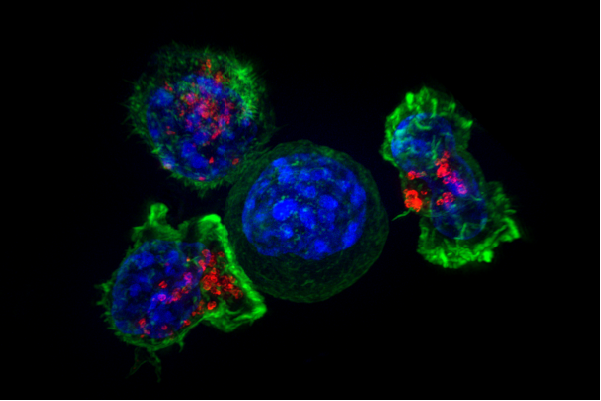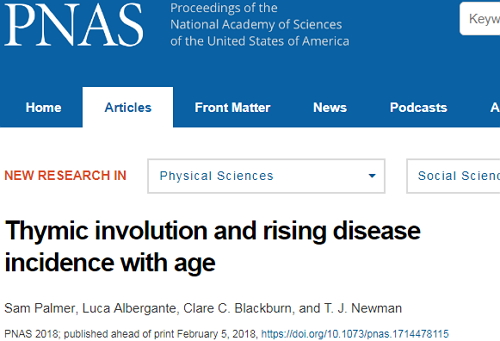Subvert the old knowledge! Declining immune system is the main cause of increased cancer incidence | PNAS
Release date: 2018-02-08

Multiple T cells surround a cancer cell (Source: NIH)
Every year, about 8 million people worldwide die from cancer. For most cancers, the risk of cancer increases with age. Moreover, the incidence of cancer in men is much higher than in women. The traditional view is that the incidence of cancer increases with age because of the accumulation of genetic mutations in cells (usually 5-6).
However, Professor Thea Newman from the University of Dundee and the scientists at Heriot-Watt University, the University of Edinburgh, and the Curie Institute in France found that the bigger reason behind this is not genetic mutation, the key is the declining immune system!

Image source: PNAS (doi.org/10.1073/pnas.1714478115)
New hypothesis: "The immune system of aging leads to an increased risk of cancer"
The Thea Newman team analyzed data from 2 million 18- to 70-year-old cancer patients to construct a mathematical equation for assessing the relationship between rising cancer incidence and immune system decline and its age distribution with 100 different cancers. Compare.
The results show that the declining immune system plays a much greater role than the expected in the occurrence and development of cancer. This means that the key to preventing cancer may be the immune system, not the genetic mutation.

The latest hypothesis: as the age increases, the number of T cells decreases, and the incidence of cancer increases (Source: PNAS)
Why does the immune system decline?
The main cause of aging in the immune system is the degradation of the thymus. The thymus is a place where T cells differentiate, develop, and mature, and is an important lymphoid organ of the body. The study found that thymic recession occurs with age, with an average reduction of nearly half every 16 years, so the production of T cells will decrease accordingly. Moreover, there is a strong correlation between the increased incidence of certain cancers and the decline in the number of new T cells.
"Immunosurveillance hypothesis" believes that cancer cells are constantly forming in the body, but under normal circumstances, the immune system will destroy them before new tumors are formed." The first author of the article, Dr. Sam Palmer, said, "T cells continue to monitor cancer." Cells, trying to destroy them. Once the immune system gets weaker, the chances of cancer cells surviving increase. And, as the thymus declines, the chances of this bad situation increase."
The researchers compared the comparison between T cells and cancer cells as a "war." Once a certain threshold is exceeded, the cancer cell will win, and it is believed that this threshold will decrease with age and with T cells. The output is proportional. This hypothesis can explain the increased probability of cancer.
Dr. Thea Newman of the University of Dundee and Dr. Sam Palmer of Heriot Watt University presented the latest research on the “incidence of cancer caused by aging in the immune systemâ€. (Video source: Dundee University)
Is the cancer rate of men higher than that of women?
Because the rate of decline in the thymus of women is slower than that of men, this has, to a certain extent, caused a gender difference in the incidence of cancer. "This is a genetic mutation hypothesis that cannot be explained," the researchers analyzed.
Almost all mainstream research on cancer is based on genetic mutations (how it occurs, how it is targeted...). Now, this latest study is not to question the fact that genetic mutations cause cancer, but to reflect on whether the genetic mutation alone can explain the rapid rise in cancer incidence, because aging can cause many changes in the body, including the immune system.
Changing the focus of cancer prevention
The research team applied this latest hypothesis to multiple projects at the National Cancer Institute. The results of the validation show that many cancers are closely related to the decline of the immune system, while others are more likely to be associated with a decline in the immune system and multiple genetic mutations.
"Although it is still too early to conclude, if this epidemiological study is further confirmed, it will change the focus of the anti-cancer cause, bringing new prevention and treatment methods." Professor Thea Newman emphasized.
Professor Clare Blackburn of the University of Edinburgh believes that this research reminds us that we need to pay more attention to the immune system in cancer research. In addition to mutations, we may also find ways to promote thymic function (transplantation or regeneration) in order to fight cancer.
Reference materials:
Aging immune system may explain age-related cancer risk increase
Source: Bio-Exploration
China Herbal Extracts,Ginseng Extract manufacturer, choose the high quality Olive Leaf Extract,Echinacea Extract, etc.China Herbal Extracts,Ginseng Extract manufacturer, choose the high quality Olive Leaf Extract,Echinacea Extract, etc.
We had passed FDA certificate and ISO 9001 .Welcome any inquiry and question on our featured products
Herbal Extracts,Ginseng Extract,Olive Leaf Extract,Echinacea Extract
Xi'an Healthway Biotech Co.,Ltd , https://www.xianhealthway.com
